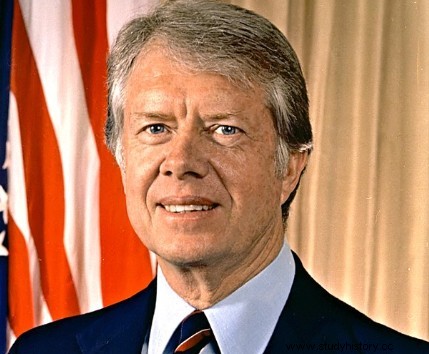He has been the President of the United States from the Deep South since the Civil War and is also known as a practitioner of human rights diplomacy.
Jimmy Carter before becoming president
James Earl Carter Jr. was born in 1924 in Georgia, known as the Deep South. Jimmy, used nominally, is James' nickname.
Jimmy Carta is the first and only president from the 10 southern states to leave during the Civil War after the Civil War.
This would indicate that the American rulership had changed during the Civil War. After the Civil War, the president is often from the north and west coast, centered on Ohio and New York, and with some exceptions such as Nixon, he is mostly from the north west coast.
Jimmy Carter's father was a farmer and his mother was a nurse. He studied at the Georgia Institute of Technology and at the Naval Academy after World War II. His final position was captain, and he was discharged after the death of his father, who was a member of Georgia, and in 1961 he became a member of Georgia, perhaps because he inherited his father's ground.
He became governor of Georgia in 1970 and was instrumental in eliminating racial discrimination in the Deep South following the passage of the Civil Rights Act.
It is well known that Rev. King made a speech, "One day my descendants and the descendants of those who were servants as slaves together on the red hills of Georgia ...", but so much black discrimination is so openly open in Georgia. Many rulers made racist remarks. Under such circumstances, Jimmy Carter's fame will rise at a stretch by arguing against racial discrimination head-on.
In 1976, Jimmy Carter ran for president and was elected. The birth of the 39th President of the United States.
The 39th President of the United States

In fact, Jimmy Carter was the first to do a parade when he took office.
Jimmy Carter wasn't so well known that he was ridiculed as "Jimmy Who?", But this performance will increase his presence at once.
He was a rare president from the sciences, so he tended to focus on data, and he was overwhelmed by the results of the polls.
Perhaps because of his nature, his policy is described by the word "human rights diplomacy."
For example, it was decided to return the Panama Canal to Panama, mediate the reconciliation between Egypt and Israel, move to normalize diplomatic relations between the United States and China, and move to disarmament with the Soviet Union.
Such diplomacy tends to be licked, and in 1979 the Soviet Union invaded Afghanistan, the Iranian Revolution and the Iranian embassy hostage incident occurred.
In response, Carter decided to boycott the Soviet Union's Moscow Olympics, and failed to resolve the embassy hostage case, resulting in a sharp drop in his approval rating.
As a result, he will be defeated in the next presidential election.
He became a rare president who could not serve for two terms as president, but for some reason he won the Nobel Peace Prize in 2002 and turned 94 as of 2019, but he is still alive.
As an aside, this blog may be the first time I've dealt with a living person.
His own human rights diplomacy continued after his resignation from the president, meeting with Cuba's chairman Fidel Castro, tackling African issues, meeting with North Korea's Kim Il Sung, publishing criticisms of Israel, and much more. There is.
In addition, he organized NGOs to solve poverty problems, volunteered, and engaged in a wide range of human rights activities.In 2015, he announced that he had cancer, and he is still fighting cancer. He is a person with mental power and action power.
